In 1977, the nation turned its back on Carter’s call for environmental responsibility. It’s never looked back
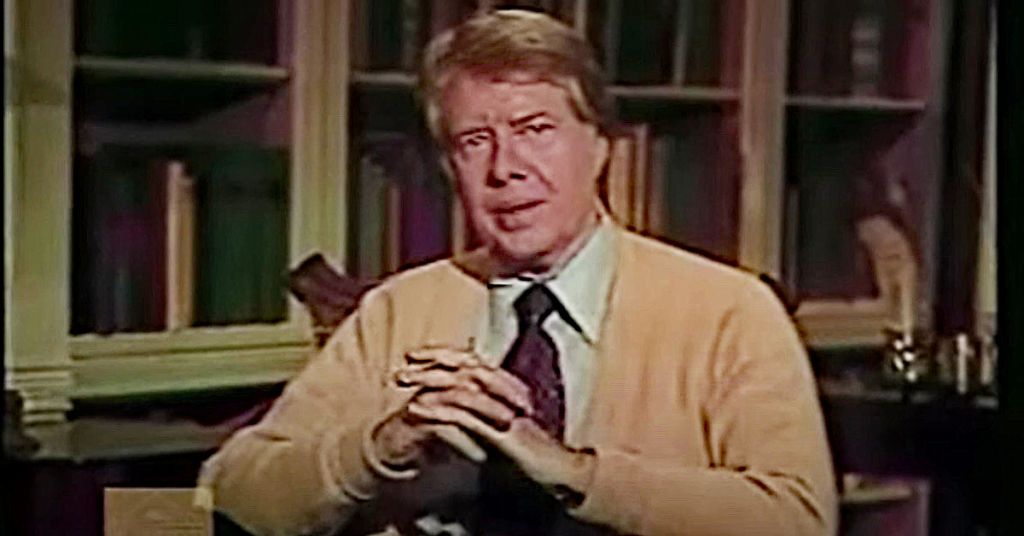
Sweater speak: Carter tried to cajole the nation into energy conservation. Screen shot: Miller Center of Public Affairs
By Chuck Thompson. December 29, 2024. Jimmy Carter loved sweaters. Famously.
As president, he wore them so often The Washington Post wrote “President Carter is doing for sweaters today what Lana Turner did for them in the 1940s.”
The paper dubbed him “The Sweater Man.” It got Ralph Lauren and Calvin Klein to offer commentary.
Carter liked the informal look but he also wore sweaters to make a point.
The most famous example is the Feb. 2, 1977, televised speech he delivered to the nation addressing the ongoing energy crisis.
Sitting next to a crackling fire, wearing a beige “grandfather” cardigan, Carter delivered some plainspoken, Depression-era wisdom.
The real problem, he told America about its unrestrained fuel consumption, was “our failure to plan for the future, or to take energy conservation seriously.”
Carter outlined steps toward a national energy policy that would “emphasize conservation” as well as “research on solar energy and other renewable energy sources.”
A few weeks earlier Carter had asked citizens to do their part by lowering their thermostats to 65 degrees at night. (During the Arab oil embargo in 1973, President Nixon had suggested dropping thermostats from 72 to 68 degrees to decrease dependence on foreign oil.)
Before that, Carter had broken with tradition by becoming the first president to walk to the White House with his wife following his inauguration, rather than ride in a motorcade.
Carter’s vice president, Walter Mondale, once recalled the results of his boss’s summertime parsimony.
“He turned off the air conditioners, and it was so hot in the White House, people would come in there … It was unbelievable. It would be a hundred above in there,” said Mondale while laughing.
Carter had 32 solar panels installed on the roof of the White House West Wing as a symbol of his faith in “the power of the sun.”
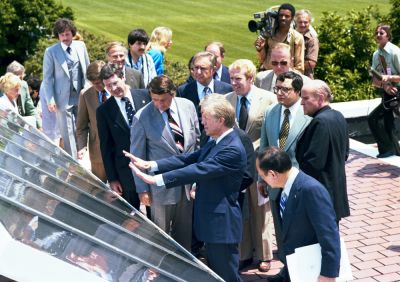
You are my sunshine: President Carter at the dedication of the solar-thermal panels at the White House, June 20, 1979. Photo: Jimmy Carter Presidential Library
“Some of these efforts will also require dedication, perhaps even some sacrifice from you,” Carter told Americans in February 1977 about efficient use of resources. He stressed “cooperation and mutual effort.”
The speech was officially titled “President Jimmy Carter’s Report to the American People on Energy.” It became known as “the sweater speech.”
Given the contemporary political climate—to say nothing of the actual climate—watching Carter’s gentle attempt to prod the nation into environmental responsibility feels borderline absurd.
Our burn-baby-burn nation feels as removed from Carter’s homespun counsel—Cold? Put on a sweater, dummy!—as it does from water beds, rotary phones and popcorn ceilings.
It also feels sad.
Carter never managed to get a handle on the hangover of the ‘60s, the condition that defined his late-‘70s administration.
And it turned out Americans were in no mood to be scolded over their belief in a providential right to urban pickup trucks, 30-yard-long refrigerated supermarket aisles filled with plastic bottles of colored sugar-water and keeping the furnace and/or A/C running even when you’re not home.
Sacrifice? What’s that?
Maybe Carter was just the wrong guy to deliver the right message.
Journalist Hendrik Hertzberg got off a good one.
“Jimmy Carter is a Low Church Protestant, where it’s a sin not to have a hard wooden bench to sit on in church,” he said. “And he brought that simplicity to the White House.”
Sorry, we can’t have it all
Throughout its existence, Columbia Insight has reported on noble efforts by well-intentioned government agencies, nonprofit groups, private companies and individuals around the Columbia River Basin to mitigate the damage caused by our voracious resource consumption.
Fish ladders. Recycling drives. Cloud seeding. Plastic bag bans. Carbon sequestering. Public transit initiatives. Clean-up weekends. Habitat restoration. Dam removal. No-till farming. Pumped storage. Anti-lawn campaigns. Native-plant nurseries. Water quality commissions. Restoration working groups. Wildlife repopulation. Sustainable tourism. Sustainable beer. Sustainable laundry soap. Sustainable whatever.
None of these are bad ideas. None of the intelligent people promoting them are wrong to do so.
In recent months we’ve reported on a grassroots effort to bring large-scale composting to rural Washington to reduce carbon emissions from landfills, the amazing reclamation of Baldwin Creek salmon habitat in Hood River, Ore., and the Boise Airport converting to 100% solar power. Why wouldn’t we? Thank God someone is tackling these jobs.

Comfortably numb: Most thermostats are advertised with a common suggested temperature. Photo: Honeywell
But in counting up all the good ways people address climate change and habitat destruction, it’s curious how the math on success always falls on the negative side of the ledger.
I think part of the problem is leaders who refuse to face up to the truth. Politicians seem to honestly believe we can have it both ways. Increased consumption and environmental conservation.
Former Ore. Gov. Kate Brown repeated a refrain common to both political parties when she signed the Private Forest Accord package into law a couple years ago.
“The package of bills I signed today is built on the understanding that, through science-based forest management, we can strike the right balance between protecting the health of our forests and creating jobs and economic growth in our rural communities at the same time,” she said.
But as we keep finding out year after dire year, that’s nonsense. We’re not even close to striking a balance between economic growth and conservation.
Put a carpenter’s level on the environment and the little bubble that’s supposed to float to the middle wouldn’t even be visible through the glass.
I’m not sure when this mindless “not only can we have it all, we deserve it all” philosophy crept into the national mythology.
Some time in the 1980s, near as I can tell.
When Oliver Stone put the words “Greed is good!” into Gordon Gekko’s mouth in Wall Street in 1987 he meant it as a warning.
America took it as a call to arms.
Truth bombs … as usual
I was around though not old enough to vote when Jimmy Carter was trying to talk Americans into the idea of personal responsibility.
I remember most of the adults around me not caring for him, and the pummeling he took from Ronald Reagan in the 1980 election.
Then Reagan very publicly having Carter’s solar panels removed from the White House. Cold? Burn more oil, dummy!

Depression begone! Throwaway convenience is a now way of life. Photo: Mike Mozart/Flickr
The broad consensus is that a poor economy and the 444-day Iran Hostage Crisis did in Carter at the polls.
His frank talk about conservation couldn’t have helped.
What’s the old saying? He who speaks the truth should keep one foot in the stirrup.
“Carter tackled the energy issue first, a costly mistake,” wrote historian Gregory L. Schneider. “He called the energy crisis ‘the moral equivalent of war,’ but energy was not a top priority for the electorate.”
It still isn’t, of course. Post-World War II Americans loathe one thing more than all others—self-sacrifice.
Truth has never been real popular either.
“I realize that many of you have not believed that we really have an energy problem,” Carter said in that February 1977 speech, a line that might as well have been delivered tomorrow, not 45 years ago.
Would we be living in a different world today had everyone heeded Carter’s advice and turned their thermostats to 65 in winter and kept the A/C to a minimum in summer?
I think so, actually. A lot of energy would have been saved; a lot of less carbon would have been released into the atmosphere.
Would climate change have been arrested? I have no idea. Probably not.
But I know we’d be in a better place if as a country we started thinking about ways to be more environmentally self-sufficient rather than reliant on a relative handful of do-gooders to keep putting fingers in dykes.
Hipsters and thrift store buyers still rock the occasional cardigan, but sweaters aren’t really in fashion these days.
Maybe a president addressing the nation in a hoodie might someday get things turned around.
Chuck Thompson is editor of Columbia Insight.
The views expressed in this article belong solely to its author and do not reflect the opinions of anyone else associated with Columbia Insight.


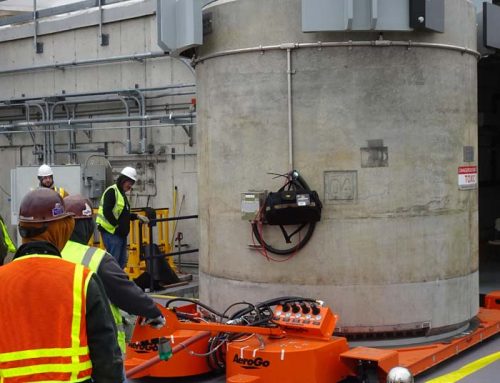
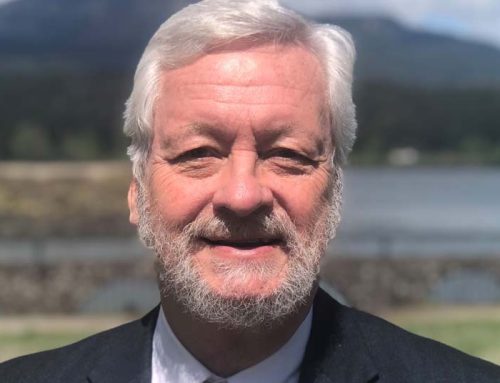
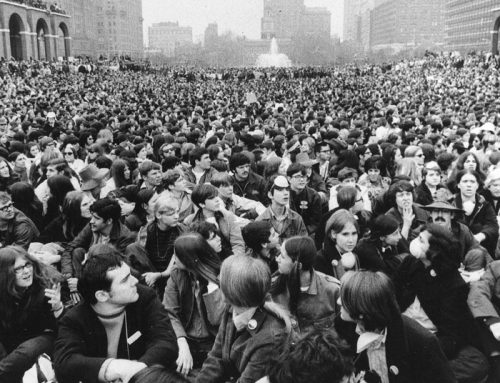
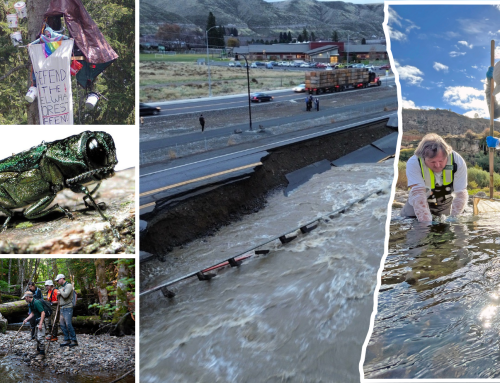
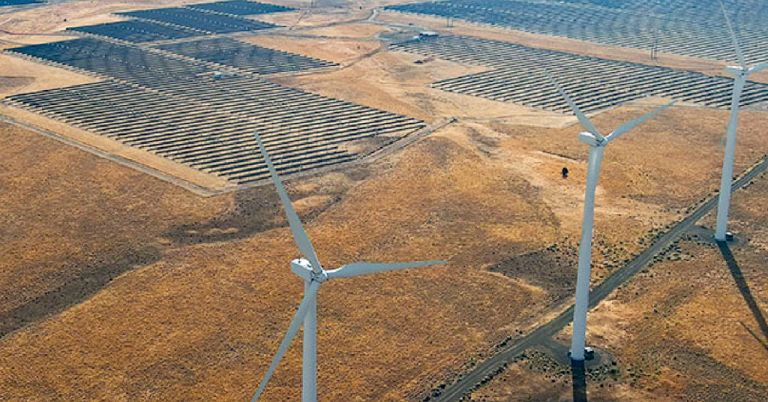
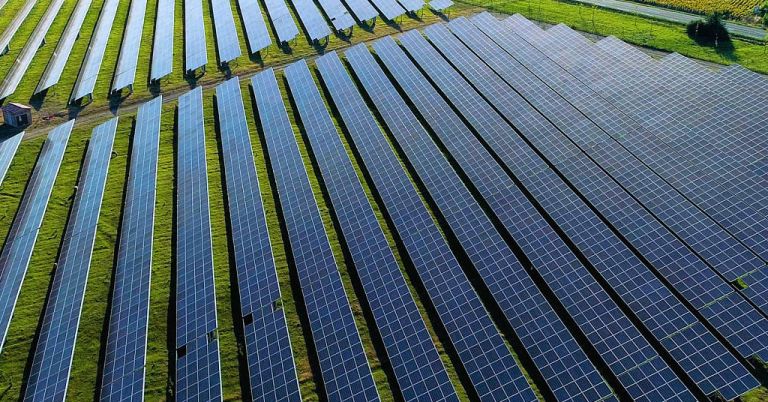
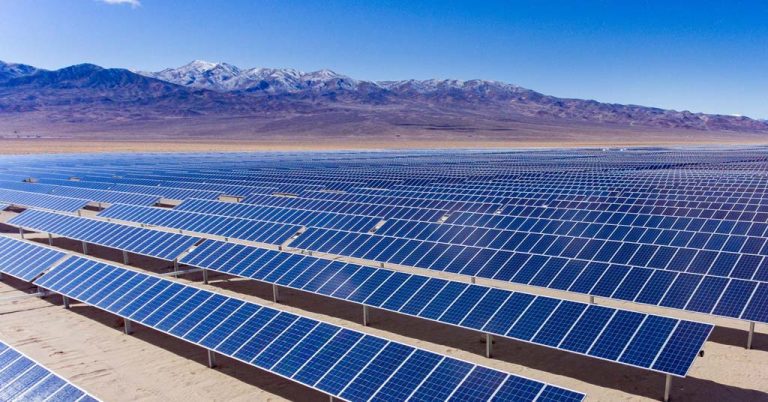


Nice sweater talk Chuck. We’ve been learning about, and working on, plastic recycle recently. In contrast, my family, currently visiting us, has a lifelong insistence on bottled water. We have at least convinced them to save the empty plastic bottles so we can recycle them. Extremely small step…
Hey, as far as I was concerned President Carter made perfectly good sense. I bought a 1972 Pinto, put 276K miles on it. Bought a 1983 Ford (Mazda) Courier, another 254K miles. During the embargoes I laughed at folks who couldn’t get fuel. Perhaps I even made the spoiled brats angry.
Enough hindsight. Looking forward there won’t be anything left to come back on, and the spoiled brats and everyone and everything else will be simply gone.
Not for all the handwringing reasons you might think, however. But for the plain and simple reason that with global warming and the concurrent opening of the Northwest and Northeast Passages, nobody will need North America anymore. Think Route US66 versus I-40.
That is one of the scenarios that all President’s, including Jimmy Carter, knew and kept quiet.
Don Trump knows this as well, as far as he is concerned, the quicker the Polar Routes are open the better. Burn baby burn! When the Inland Pacific Northwest is a replica of Central Asia, well, to be kind, summer temperatures on the internet show it to be quite hot over there. And until you folks understand the problem, there is no chance of a solution.
Good journalism Chuck. I also grew up during the same period and remember it very much the same as you. As a retired environmental engineer what came after Carter was not what was needed.
I still remember the contempt with which conservatives responded to his environmental concerns. And the indifference of most liberals and moderates as well. It’s embarrassing. But not as embarrassing as the embrace that followed for his laughably ignorant and soon-to-be senile successor.